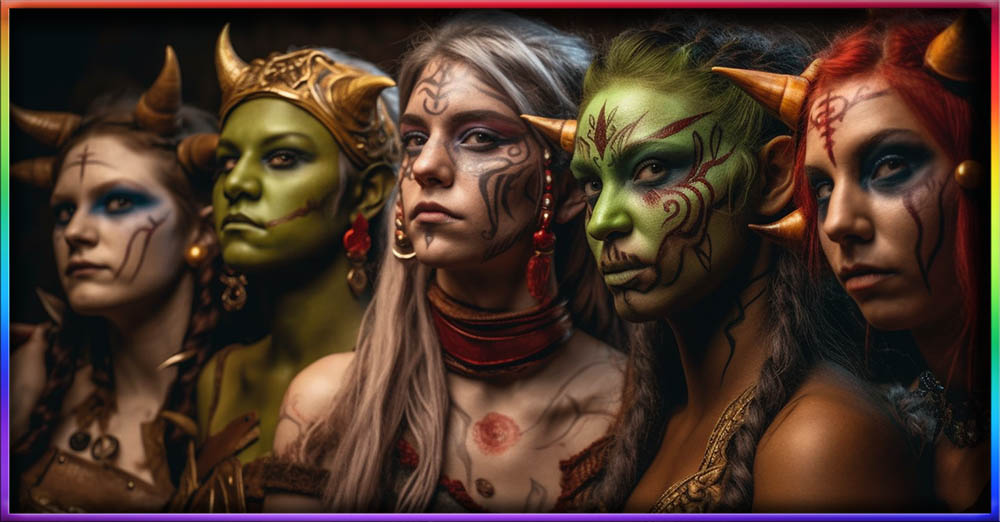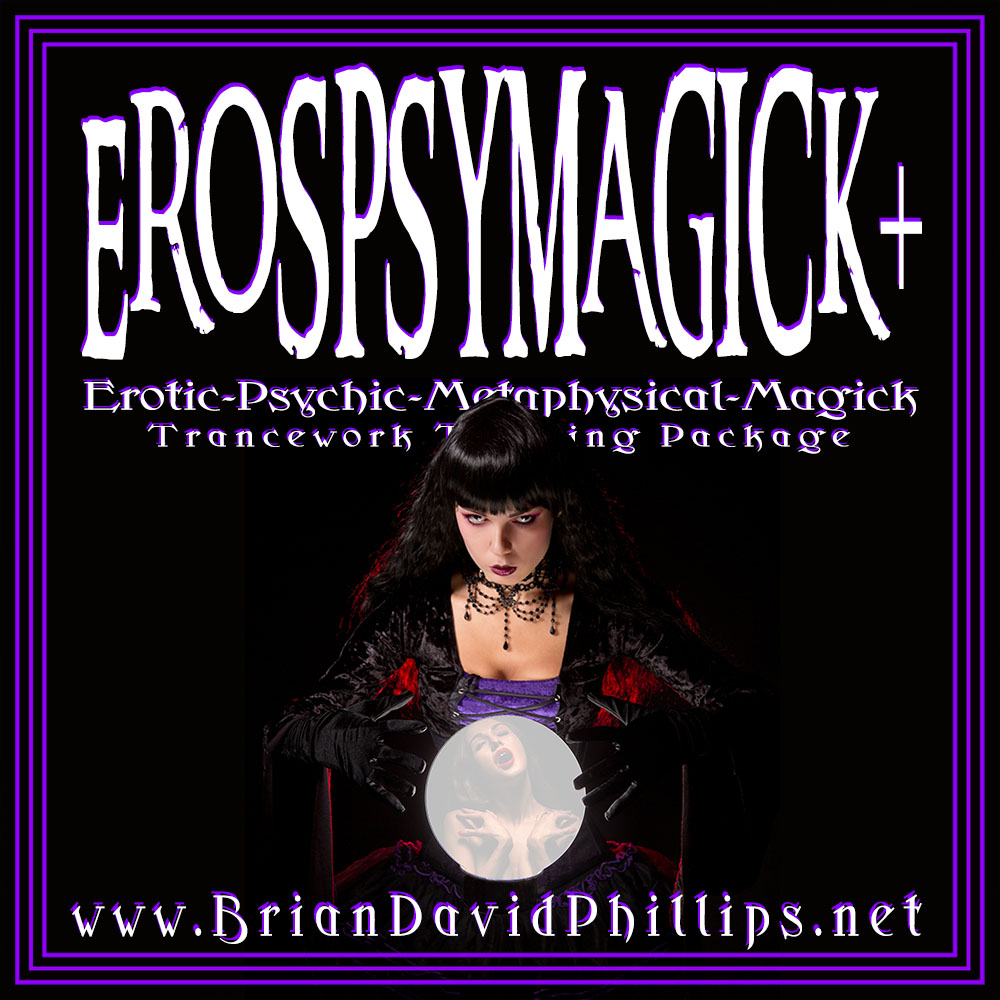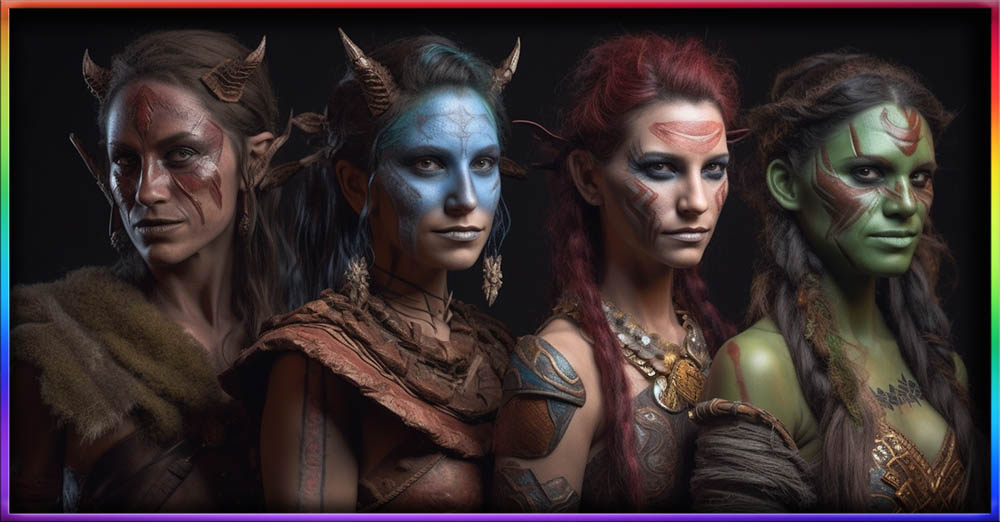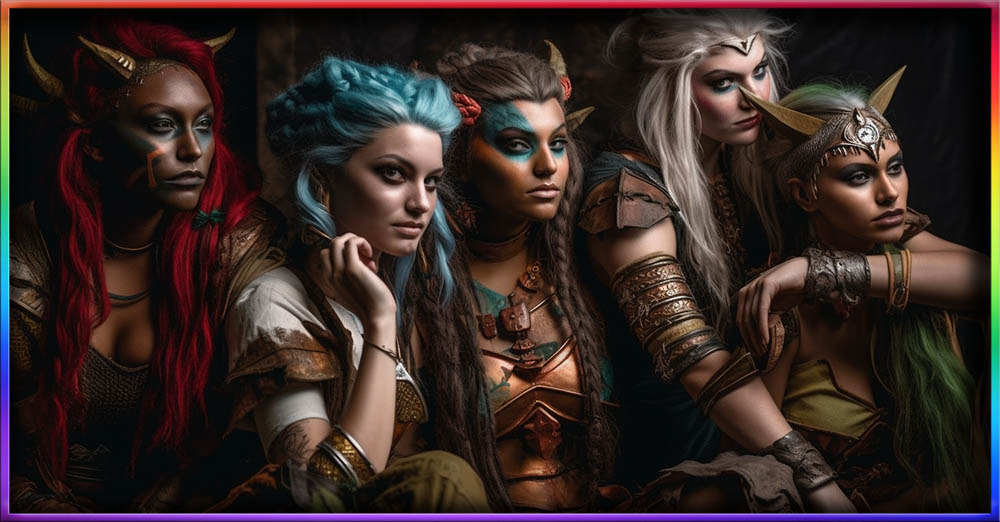
Why the Removal of Mixed-Race Characters is Problematic
Egg on face . . . oops . . . and all that stuff. Wizards of the Coast has now clarified that when they said that racist thing they said, they meant something else. So having mixed-race characters is okay now but calling them half-elf or half-orc is racist. So, it’s the terms that are now gone and they will ask players to use different rules to create mixed-species characters. It’s another one of those unclear communication things from a company that specializes in writing rulesets that are sometimes less than clear. So, good that they backtracked (er, clarified) but I am standing behind what I wrote here even though things have been changed. Yes, the terms half-elf and half-orc and half-blood and the like do have racist overtones . . . it would have been nice if they’d made that bit clear at the get-go. I would have been saved from going down a rabbit-hole where most folks also took their solution to be removing mixed-race characters completely. When the white nationalists are cheering your move, then you might want to check your move.
The Removal of Mixed-Race Characters from Dungeons and Dragons
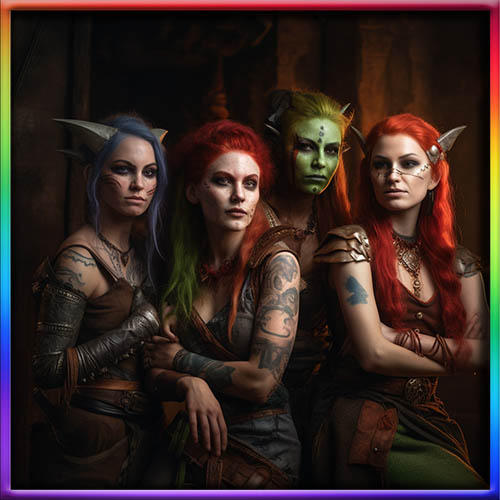
In recent years, discussions around representation and diversity in popular culture have become increasingly prominent, with many arguing for the need to create more inclusive media. One area where this conversation has come to the forefront is in the realm of fantasy literature and gaming. Dungeons and Dragons (D&D) is a popular tabletop fantasy role playing game that has been enjoyed by millions of people worldwide since the 1970s (which I began playing while in high school in the late 70s and am still playing with some of the very same friends I played with back then; as many readers here know, I am an Associate Professor at a well-regarded university in Taiwan and first used D&D in my classes back in 1990 and was even interviewed on the subject for a popular television program and use tabletop TPGs in class still today so I’m invested in this subject). However, a recent decision by the game’s publisher, Wizards of the Coast (WotC), to remove half-elf, half-orc, and other mixed-race type characters from the game has sparked controversy. The decision was made on the grounds that these character types are racist, but many argue that removing them is even more racist. This essay will argue that the decision to remove mixed-race characters from D&D is a racist one. The erasure of these characters perpetuates harmful ideas about race and reinforces harmful policies that aim to maintain racial and species homogeneity. Furthermore, there is ample evidence that humans have mated with other species in our past, and mixed-race relationships and marriages are increasingly prevalent in modern society. As such, dropping the idea of mixed-race characters in D&D feels like a step backward in the fight for representation and inclusivity in popular culture.
The Wizards of the Coast’s Decision:
A Step Backward for Diversity and Inclusion
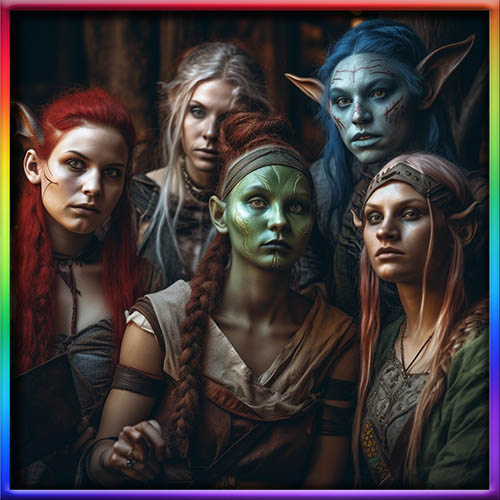
The Wizards of the Coast’s decision to remove half-elf, half-orc, and other mixed-race type characters from Dungeons and Dragons was met with confusion and criticism. The publisher explained that the decision was made in response to feedback from players who felt that these character types were racist. WotC argued that the mixing of races or species in the game’s lore perpetuated harmful stereotypes and promoted homogeneity, which is antithetical to the game’s core values of diversity and inclusivity. However, many argue that the decision to remove these characters is misguided and ultimately perpetuates harmful ideas about race. Obviously, I would argue that eliminating mixed-race characters is more likely to promote an anti-miscegenation pro-homogeneous world view than having them.
One of the main criticisms of the Wizards of the Coast’s decision is that it ignores the complexities of mixed-race relationships and reinforces harmful ideas about racial purity. By erasing mixed-race characters from the game, WotC is promoting the idea that proper Elves, Humans, Orcs, or Dwarves would never marry someone not of their own race/species. However, this is a flawed and harmful notion that ignores the reality of human history and the many different forms of human relationships that have existed throughout time. In modern society, one in six new marriages in the United States are mixed race, and one in six marriages in Taiwan are mixed nationality. Erasing mixed-race characters from the game ignores the reality of the world we live in and perpetuates harmful stereotypes about race and ethnicity. I once asked a player not to dip into that sort of racist roleplay in a game I was running (his elf character said some hardcore racist things about half-elf NPCs in the game and I told him that as a Dungeon Master, I have no patience for racist PCs just as I don’t have patience for racists in real life).
Furthermore, the removal of mixed-race characters from Dungeons and Dragons is also detrimental to representation and inclusivity in popular culture. Fantasy literature and gaming have long been criticized for their lack of diversity, with many arguing that they perpetuate harmful stereotypes and exclude underrepresented groups. By removing mixed-race characters from the game, WotC is essentially erasing an entire group of people who may feel represented by these characters. This erasure is especially harmful given that mixed-race individuals often face unique challenges related to their identity, including discrimination and prejudice. By excluding these characters from the game, WotC is essentially sending the message that these individuals don’t belong in the fantasy world, which can be alienating and hurtful to many players.
The Implications of the Wizards of the Coast’s Decision:
Perpetuating Harmful Stereotypes
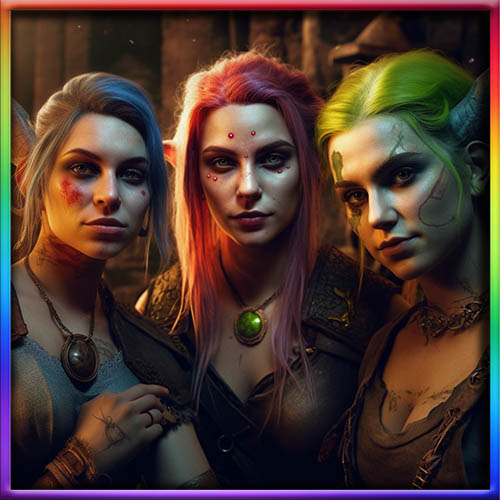
The implications of the Wizards of the Coast’s decision to remove mixed-race characters from Dungeons and Dragons are far-reaching and potentially damaging. By promoting the idea that mixed-race relationships are unacceptable or unnatural, WotC is perpetuating harmful stereotypes and promoting the idea that racial purity is desirable. This is a deeply problematic and dangerous idea, as it reinforces harmful policies like anti-miscegenation laws that have been used throughout history to oppress and marginalize minority groups.
Moreover, the decision to remove mixed-race characters from the game has the potential to harm players who identify as mixed-race or who come from mixed-race backgrounds. Many individuals who are mixed-race face unique challenges related to their identity, including discrimination, marginalization, and a lack of representation in popular culture. By erasing mixed-race characters from D&D, WotC is essentially saying that these individuals don’t belong in the fantasy world, which can be incredibly hurtful and alienating. This erasure can reinforce feelings of isolation and otherness, which can be damaging to a person’s mental health and wellbeing.
Additionally, the decision to remove mixed-race characters from Dungeons and Dragons has broader implications for representation and inclusivity in popular culture. Fantasy literature and gaming have long been criticized for their lack of diversity, and the erasure of mixed-race characters from the game only reinforces this criticism. In a world where representation and inclusivity are becoming increasingly important, it is vital that media outlets like Dungeons and Dragons do their part to ensure that all individuals feel seen and valued. By removing mixed-race characters from the game, WotC is essentially saying that these individuals are not important or valuable enough to be represented in the fantasy world, which is deeply problematic and hurtful.
The Importance of Mixed-Race Characters in Dungeons and Dragons:
Reflecting Diversity in Society
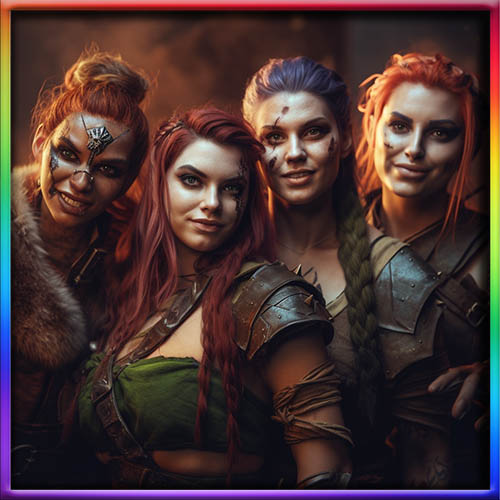
Mixed-race characters have always been an integral part of Dungeons and Dragons’ lore and world-building. These characters represent a diverse range of backgrounds and experiences, and they offer players a unique perspective on the world of D&D. They challenge traditional notions of racial purity and encourage players to think beyond the rigid racial and cultural boundaries that often define fantasy worlds. By removing mixed-race characters from the game, WotC is essentially erasing an entire group of people who play an important role in the game’s narrative and themes.
Furthermore, mixed-race characters in Dungeons and Dragons can serve as a powerful representation of real-world diversity and inclusivity. The game has always been a space for players to explore their identities and experiment with different aspects of their personality. Mixed-race characters provide players with a platform to explore the complex and multifaceted nature of their own identities, and they offer a sense of belonging and representation to players who may not see themselves represented in other areas of popular culture. By including mixed-race characters in the game, WotC is essentially saying that all players, regardless of their race or background, are valued and important members of the fantasy world.
Moreover, mixed-race characters in Dungeons and Dragons offer players a unique opportunity to explore the themes of identity, belonging, and acceptance. These characters often struggle with issues related to their heritage and their place in the world, and they offer players a chance to explore the complexities of their own identities in a safe and supportive environment. By removing mixed-race characters from the game, WotC is essentially saying that these themes are not important or valuable, which is deeply problematic and harmful. Players should be encouraged to explore these themes and to think critically about their own identities and experiences, and mixed-race characters provide an important framework for these explorations to take place.
The Prevalence of Mixed-Race Relationships and Marriages:
A Reality in the Gaming Community
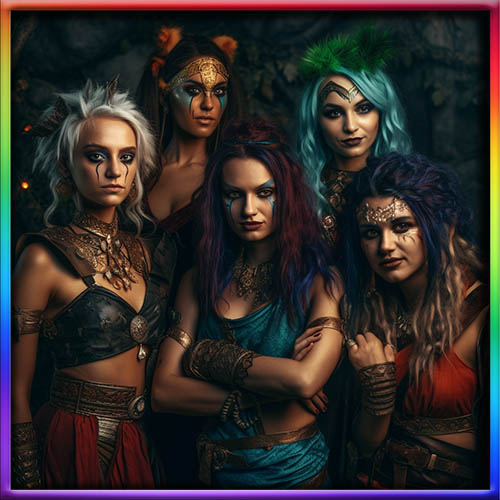
Mixed-race relationships and marriages are becoming increasingly prevalent in our society, and this trend is reflected in the world of Dungeons and Dragons. According to recent statistics, one in six new marriages in the United States are between individuals of different racial or ethnic backgrounds. This trend is also evident in other parts of the world, such as Taiwan, where one in six marriages are between individuals of different nationalities. As I noted earlier, I am from the US and live in Taiwan (I am also a D&D player who is in a mixed-race marriage and have a mixed-race child). As such, the decision by the Wizards of the Coast to remove mixed-race characters from the game is out of touch with the reality of modern society.
Furthermore, mixed-race relationships and marriages have played an important role in the development of our species. Genetic evidence suggests that humans interbred with other species, such as Neanderthals and Denisovans, in our distant past. This interbreeding contributed to the genetic diversity that characterizes our species today, and it played an important role in our evolution as a species. By removing mixed-race characters from Dungeons and Dragons, WotC is essentially denying the importance of this genetic diversity and the role that it has played in our development as a species.
In addition, mixed-race relationships and marriages are an important aspect of representation and inclusivity in popular culture. Media outlets like Dungeons and Dragons have a responsibility to reflect the diversity of our society and to promote inclusivity and acceptance. By including mixed-race characters in the game, WotC can help to challenge harmful stereotypes and to promote the idea that all individuals, regardless of their race or background, are valuable and important members of society. Moreover, mixed-race characters offer a unique perspective on the world of D&D, and they can serve as powerful representations of diversity and inclusivity in the fantasy world.
Overall, the prevalence of mixed-race relationships and marriages highlights the importance of representation and inclusivity in popular culture. Media outlets like Dungeons and Dragons have a responsibility to reflect the diversity of our society and to promote acceptance and understanding. By removing mixed-race characters from the game, WotC is essentially denying the importance of this diversity and the role that it plays in our society and our evolution as a species. It is essential that we promote representation and inclusivity in all areas of popular culture, and that we challenge harmful stereotypes and promote acceptance and understanding of all individuals.
Genetic Evidence for Mixed-Species Mating in Human History:
A Scientific Basis for Diversity
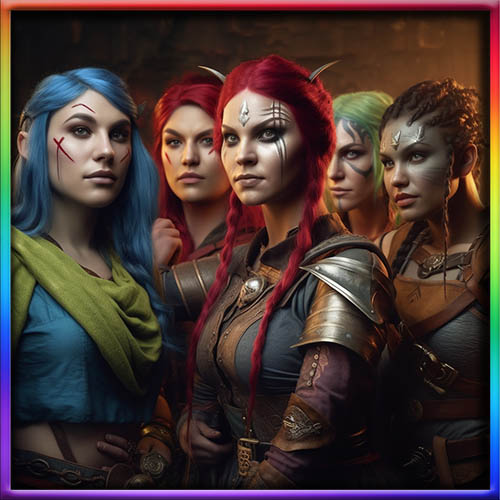
This stuff is not just about fantasy characters, mixed-race relationships have a very strong essence sewn into the very fabric of our species. Genetic evidence suggests that humans interbred with other species in our distant past. The most well-known examples of such interbreeding are with Neanderthals and Denisovans, two species of hominids that coexisted with humans in different parts of the world. The interbreeding is evident in our DNA, as individuals of non-African descent have Neanderthal DNA in their genome. In fact, Neanderthal DNA makes up approximately 1-4% of the genomes of modern humans of European and Asian descent. Similarly, Denisovan DNA has been found in the genomes of modern humans in Asia, particularly in populations from Papua New Guinea and Australia.
These findings demonstrate that humans have a complex evolutionary history, and that we have engaged in interbreeding with other hominid species throughout our history. This interbreeding contributed to the genetic diversity that characterizes our species today, and it played an important role in our evolution as a species. It is important to note that while the interbreeding may have been infrequent, it did occur and left a lasting genetic legacy in our DNA.
The fact that humans engaged in interbreeding with other hominid species challenges the notion of biological purity and highlights the complex and diverse nature of our evolutionary history. It is also a reminder that the concept of race, as it is often understood in modern society, is a social construct rather than a biological reality. By including mixed-species characters in Dungeons and Dragons, WotC can help to challenge harmful stereotypes and promote the idea that all individuals, regardless of their genetic background, are valuable and important members of society.
Genetic evidence for mixed-species mating in human history highlights the complex and diverse nature of our evolutionary history. It challenges the notion of biological purity and highlights the fact that the concept of race is a social construct rather than a biological reality. By including mixed-species characters in Dungeons and Dragons, WotC can promote the idea that all individuals, regardless of their genetic background, are valuable and important members of society.
The Racist Implications of the Wizards of the Coast’s Decision:
Ignoring the Reality of Mixed-Race Individuals
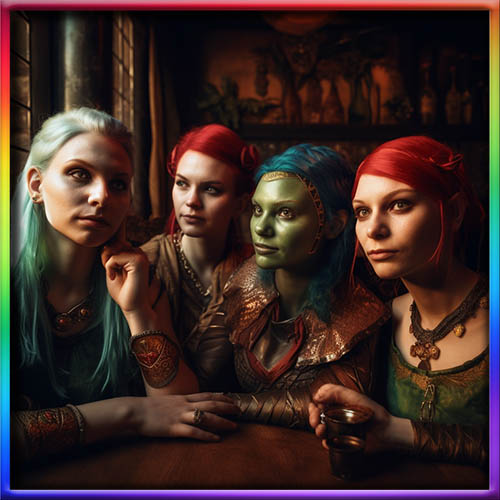
The Wizards of the Coast’s decision to remove half-elf and half-orc type characters from Dungeons and Dragons has been met with criticism from many fans of the game, who argue that it is racially motivated. By removing the option for players to create mixed-race characters, WotC is perpetuating harmful stereotypes about race and promoting the idea of racial purity.
The decision implies that the only acceptable characters in the game are those who are “pure” members of their respective races or species. This reinforces the idea that different races or species should remain separate and not mix, which is a core tenet of racist ideologies. This decision also suggests that mixed-race characters are somehow less valid or less desirable than “pure” characters, which further perpetuates harmful stereotypes about mixed-race individuals in real life.
The decision by WotC to remove mixed-race characters from the game is not only harmful, but it is also deeply misguided. It ignores the fact that mixed-race individuals exist in the real world and have been an integral part of human history and culture for centuries. To erase the possibility of mixed-race characters in a fantasy game, where players have the opportunity to explore and create different worlds and characters, is to deny the reality and complexity of human experience.
The decision by WotC to remove mixed-race characters from Dungeons and Dragons is not only racially motivated but also has implications for the wider gaming community. By perpetuating harmful stereotypes and promoting the idea of racial purity, WotC is sending a message to gamers that such ideologies are acceptable and even desirable. This has the potential to create a toxic gaming environment that is unwelcoming and exclusionary to individuals from diverse backgrounds.
As we see, the decision by WotC to remove half-elf and half-orc type characters from Dungeons and Dragons is not only racially motivated but also has wider implications for the gaming community. It reinforces harmful stereotypes about race, promotes the idea of racial purity, and ignores the reality and complexity of human experience. By excluding mixed-race characters from the game, WotC is sending a message that such ideologies are acceptable, which has the potential to create a toxic gaming environment that is exclusionary to individuals from diverse backgrounds.
The Need for Change:
Promoting Diversity and Inclusion in Gaming
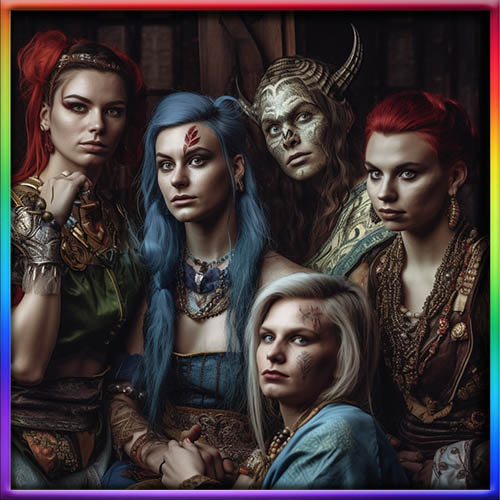
The decision by the Wizards of the Coast to remove mixed-race characters from Dungeons and Dragons is a step backward for the game and for society as a whole. As a society, we need to move away from harmful stereotypes and promote diversity and inclusion in all aspects of life, including in gaming.
There is a growing recognition of the importance of representation in media and entertainment, and this extends to the gaming community. Players should have the ability to create characters that reflect their own identities and experiences, including mixed-race characters. This is not only important for the individual player but also for the wider gaming community, as it promotes diversity and inclusion and creates a more welcoming and inclusive environment.
The removal of mixed-race characters from Dungeons and Dragons is not only harmful but also unnecessary. There are many ways that WotC could address the issue of racial stereotypes and promote diversity and inclusion in the game without removing the option for players to create mixed-race characters. For example, they could include more diverse representation of characters in the game, including more characters of color or characters from diverse backgrounds.
Ultimately, the decision by WotC to remove mixed-race characters from the game is a missed opportunity to promote diversity and inclusion in the gaming community. It perpetuates harmful stereotypes about race and sends a message that mixed-race individuals are somehow less valid or less desirable than “pure” individuals. It is time for WotC to recognize the harm that their decision has caused and to take steps to promote diversity and inclusion in the game. This includes the inclusion of mixed-race characters, as well as other measures to promote diversity and inclusion, such as diverse representation of characters in the game and initiatives to make the game more welcoming and inclusive to players from diverse backgrounds.
Racist Half-Elves and Half-Orcs?
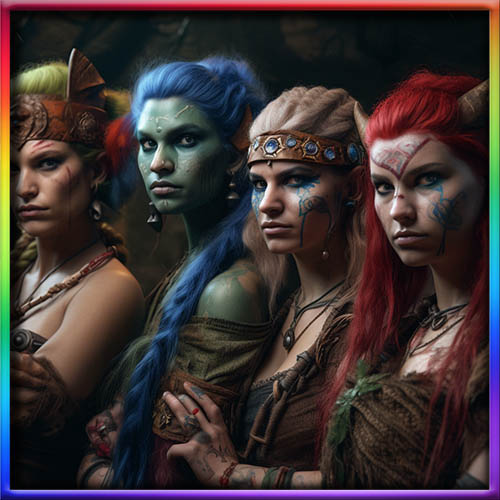
Yes, this seems more personal to me than it should . . . yet, here we are. Some folks explain the Wizards decision in the context that terms like “half-elf” and “half-orc” and the like play into racist tropes in a way that Dungeons and Dragons is trying to get away from in general. The idea is that your race doesn’t carry so much weight, being replaced instead with culture, upbringing, training, etc.
Okay, I understand and I get that but they’re still keeping “races” (species now) and erasing the possibility for mixed characters, essentially erasing the possibility from the D&D multiverse which fits into the no-race-mixing fantasy world of white supremacists more than the diversity posture WotC had been moving toward previously.
Robby Soave: Dungeons & Dragons CANCELS ‘Inherently Racist’ Half-Elves, Half-Orcs From Game
You can also see the video at https://www.youtube.com/watch?v=65RAPsyJrww.
It would not be wrong to guess that my own extremely negative reaction to this move is based in part because of my own mixed-marriage and the fact that my own daughter has spent her life dealing with awful people with very black-or-white views about race. This erasure feels more betrayal and regression than progress.
Moving Towards a More Inclusive Gaming Community
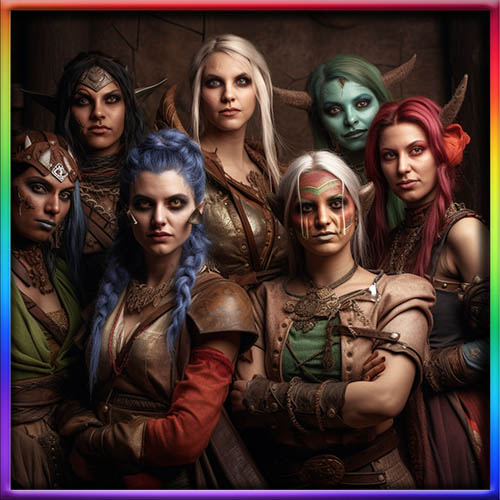
The decision by the Wizards of the Coast to remove mixed-race characters from Dungeons and Dragons is a step backward for the game and for society as a whole. It perpetuates harmful stereotypes about race and sends a message that mixed-race individuals are somehow less valid or less desirable than “pure” individuals. This is not only harmful but also unnecessary, as there are many ways that WotC could address the issue of racial stereotypes and promote diversity and inclusion in the game without removing the option for players to create mixed-race characters.
As a society, we need to move away from harmful stereotypes and promote diversity and inclusion in all aspects of life, including in gaming. Players should have the ability to create characters that reflect their own identities and experiences, including mixed-race characters. This is not only important for the individual player but also for the wider gaming community, as it promotes diversity and inclusion and creates a more welcoming and inclusive environment.
It is time for WotC to recognize the harm that their decision has caused and to take steps to promote diversity and inclusion in the game. This includes the inclusion of mixed-race characters, as well as other measures to promote diversity and inclusion, such as diverse representation of characters in the game and initiatives to make the game more welcoming and inclusive to players from diverse backgrounds.
The removal of mixed-race characters from Dungeons and Dragons is a regressive step that reinforces harmful stereotypes and undermines the principles of diversity and inclusion. It is time for WotC to listen to the voices of the gaming community and take action to promote diversity and inclusion in the game. Only by working together can we create a gaming community that is truly welcoming and inclusive for all players.
Frequently Asked Questions:
Mixed-Race Fantasy Characters and Racism
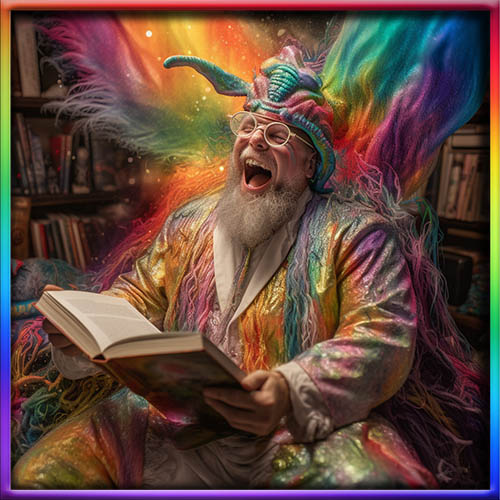
Q: What is the controversy surrounding the removal of mixed-race characters from Dungeons and Dragons?
A: The Wizards of the Coast recently decided to remove half-elf and half-orc type characters from Dungeons and Dragons, citing concerns about racism. Many players and critics argue that this decision is actually racist and undermines the principles of diversity and inclusion.
Q: Why did the Wizards of the Coast decide to remove mixed-race characters?
A: WotC claims that the removal of mixed-race characters is part of a larger effort to address concerns about racism in the game. However, many players and critics argue that this decision is misguided and unnecessary.
Q: What are the implications of the Wizards of the Coast’s decision?
A: The decision to remove mixed-race characters from the game sends a message that mixed-race individuals are somehow less valid or less desirable than “pure” individuals. This reinforces harmful stereotypes about race and undermines the principles of diversity and inclusion.
Q: Why are mixed-race characters important in Dungeons and Dragons?
A: Mixed-race characters reflect the diversity of society and allow players to create characters that reflect their own identities and experiences. They also promote diversity and inclusion in the game and create a more welcoming and inclusive environment for all players.
Q: How prevalent are mixed-race relationships and marriages in the gaming community?
A: Mixed-race relationships and marriages are common in the gaming community, as well as in wider society. In fact, one in six new marriages in the US are mixed race and one in six marriages in Taiwan are mixed nationality.
Q: Is there genetic evidence for mixed-species mating in human history?
A: Yes, there is ample genetic evidence that humans mated with other species in our past, including Neanderthal, Denisovan, and other species.
Q: How does the Wizards of the Coast’s decision reinforce harmful stereotypes?
A: The decision to remove mixed-race characters reinforces the harmful stereotype that mixed-race individuals are somehow less valid or less desirable than “pure” individuals. This sends a message that diversity and inclusion are not important and undermines the principles of equality and respect for all individuals.
Q: What can the gaming community do to promote diversity and inclusion?
A: The gaming community can take a number of steps to promote diversity and inclusion, including promoting the inclusion of mixed-race characters, diverse representation of characters in the game, and initiatives to make the game more welcoming and inclusive to players from diverse backgrounds.
Q: What is the importance of promoting diversity and inclusion in gaming?
A: Promoting diversity and inclusion in gaming is important for creating a more welcoming and inclusive environment for all players. It also reflects the diversity of society and helps to promote greater understanding and respect for individuals from diverse backgrounds.
Q: How can the Wizards of the Coast address concerns about racism in the game without removing mixed-race characters?
A: There are many ways that WotC could address concerns about racism in the game without removing the option for players to create mixed-race characters, such as by promoting diverse representation of characters in the game and creating initiatives to make the game more welcoming and inclusive to players from diverse backgrounds.
Q: What are the long-term implications of the Wizards of the Coast’s decision?
A: The long-term implications of the decision to remove mixed-race characters are unclear, but it could undermine the principles of diversity and inclusion in the game and send a message that mixed-race individuals are somehow less valid or less desirable than “pure” individuals.
Q: How do players feel about the Wizards of the Coast’s decision?
A: Many players are upset about the decision to remove mixed-race characters.
Q: Does the removal of half-elf and half-orc characters affect the gameplay of Dungeons and Dragons?
A: Yes, it does. These character types have been a part of the game for a long time, and their removal can affect the way players build their characters and the overall feel of the game. Additionally, the removal of these characters sends a message to players that mixed-race characters are not acceptable, which can be problematic for players who identify with these character types.
Q: Can Wizards of the Coast reverse their decision and bring back half-elf and half-orc characters?
A: Yes, they can. As a company, Wizards of the Coast has the power to make decisions about their product. However, the decision to remove these characters was made after careful consideration, and it would take a significant change in perspective for them to reverse their decision.
Q: What can I do as a player to address the issue of racism in Dungeons and Dragons?
A: As a player, there are several things you can do. First, you can speak out against the removal of half-elf and half-orc characters and advocate for the inclusion of mixed-race characters in the game. You can also create mixed-race characters in your own gameplay to show that these characters are valid and important. Additionally, you can educate yourself and other players about the issue of racism in the game and work to create a more inclusive and welcoming gaming community.
Q: Where can I learn more about trancework practice by Prof. Phillips?
A: Of course, those wishing to explore even more may consider learning packages such as our ErosPsyMagick+ program at https://briandavidphillips.net/erospsymagickplus which is of particular interest as it has everything rolled into one comprehensive package . . . core skills, metaphysical magickal psychic, and eroticatrance ecstatic states.
You Can Learn More
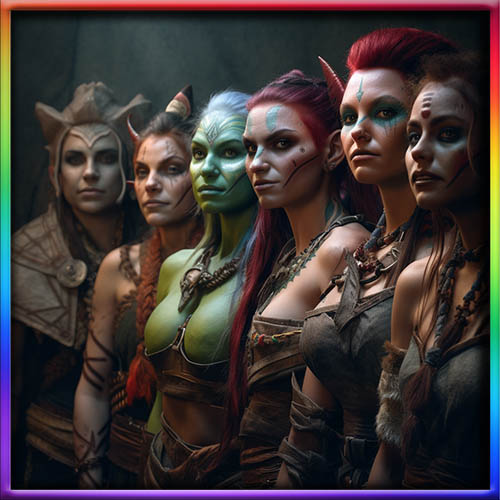
If you would like to learn more about using hypnosis techniques, consult our Core Skills program and other products found in our online store at https://briandavidphillips.net/store (you may wish to check out our package programs for even more value).
Our ErosPsyMagick+ program at https://briandavidphillips.net/erospsymagickplus is of particular interest as it has everything rolled into one comprehensive package . . . core skills, metaphysical magickal psychic, and eroticatrance ecstatic states.
If you’re in Taiwan and interested in hypnosis, check the services page linked to in the top left sidebar. Not in Taipei? Check the store for recordings in the same menu area as well as links to lots and lots of info and goodies. Of course, browsing this site will bring you to a digital ton of positive resources on a wide variety of topics as well.
Live Trance and Prosper,
Brian David Phillips
Trance Wizard
www.BrianDavidPhillips.net
Tarot Decks and More
https://www.makeplayingcards.com/sell/wakingdreams
